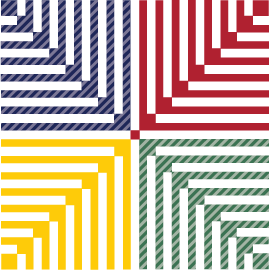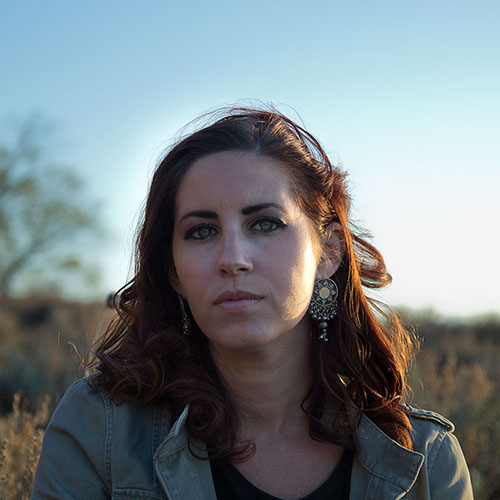The Judge introduces us to the vibrance of Kholoud Faqih, the first female Shari’a judge in the Middle East. Practicing in Ramallah, Kholoud’s career trajectory and personal grit are the center of this documentary by Erica Cohn. At once inspiring and self-aware, the film offers audiences the chance to examine the ways religion, culture, tradition, and history interconnect and intersect. We spoke to Cohn ahead of Tuesday’s screening of The Judge.
BPFF: Why Kholoud? Why this the story?
EC: While I was on a shooting hiatus with my last film, In Football We Trust, I received a Rotary Ambassadorial Scholarship in Israel/Palestine. There I taught film, mentored local filmmakers, assisted NGOs launch media advocacy projects, and continued my post-graduate research in Islamic feminism at Hebrew University. One day, a dear friend and colleague invited me to attend a Shari’a law reform meeting in Ramallah.
I was welcomed into a large conference room filled with the images of Arafat throughout the years hanging in old picture frames and seated at a table surrounded by men in tarbooshes (hats that judges and sheikhs wear). Then Judge Kholoud walked in and everyone stood to great her. I was immediately struck by her presence—her confidence—her command of the room. I wanted to know more. Who was this woman? What was her story?
Judge Kholoud and I were introduced at the end of the meeting, and I was moved by her charisma and personal story. After spending her first years as an attorney representing women who were survivors of domestic violence, Kholoud felt she could best catalyze change in the Shari’a courts, where familial cases are adjudicated. She then turned to the Shari’a text to prove that women could be judges and began studying for the judicial exams. I remember asking her how she felt about the mistreatment of women under Shari’a…to which she responded, the problem isn’t with the Shari’a, it is with the interpretation (or rather misinterpretation).
Upon learning I was a filmmaker, Kholoud immediately expressed enthusiasm in making a film about her journey. She hoped that sharing her story would inspire other women and girls throughout the Muslim world to pursue leadership roles in their communities, despite cultural and/or traditional norms. Thus, The Judge was born.
BPFF: How long did it take to make the film? It seemed like you were with Kholoud from the very beginning—from when she was first appointed, through the hardship of five years off the bench, and out again on the other side. When did you realize you had a full-length doc on your hands?
EC: It took a little over five years to make The Judge, and I knew from the beginning it could easily be a feature-length documentary. However, I will admit that with funding challenges along the way, there were definitely times when I considered turning this into a short film. Ultimately I knew I couldn’t do justice to Kholoud’s story within the confines of short form. Therefore I continuously and feverishly wrote grants, pitched the project at forums, and solicited donations whenever/wherever I could.
BPFF: The importance of intersectional representation within political structures was a big theme—what other themes were you thinking of as Kholoud’s story came together?
EC: I have always been fascinated with how law is interpreted—how power, economics, and/or status can influence implementation. I am captivated by the intersection and tension between religion, culture, and identity. I am drawn to narratives about strong women. Kholoud’s story stuck with me, and I felt that her experiences might invoke a more nuanced understanding of Shari’a, challenge rapidly increasing global Islamophobia, and highlight positive advancements for women by women in the Middle East, which are often uncovered or ignored by mainstream media.
BPFF: It seemed clear to me that you wanted to address the misinterpretation of Shari’a law head on. But was that a big part of the whole picture for you? How did you navigate the sensitivities of this?
EC: Women’s leadership is a huge component of this for me. Conversations on the street in Palestine were very similar to the conversations people were having here in the US during the Hillary Clinton campaign. We scrutinize women for being too emotional, too stiff, incapable to be a mother and a career woman—the list goes on and on. Judge Kholoud is brilliant in her fight against patriarchy, her struggle for justice, and her living embodiment of what it means to be a woman.
I studied Islamic feminism, I spoke Arabic conversationally, I lived in Palestine…all of these helped navigate the film’s sensitivities. But most of all, I was vulnerable, I listened, and then I agonized about getting every detail right and doing this story justice.
BPFF: The scenes with Kholoud’s parents and grandmother were some of the most touching, beautiful moments. As a director, how do you navigate trust with subjects? Would love to know more about your crew and how you put together your team.
EC: I believe the moments captured on camera are as a result of the moments cultivated off camera. Judge Kholoud is a dear friend…she was an active participant throughout the making of the film. Amber [Fares] brought an additional element of life and love behind the camera during this particular scene. We had an almost entirely Palestinian crew during production—it was only natural.
BPFF: For whom is this film meant? Who needs to watch this film?
EC: Everyone! [Laughs] Judge Kholoud’s resilience and determination greatly impacted all of us during the making of the film and will encourage others around the world to persevere through adversity—in asserting legal rights, achieving gender justice, and challenging cultural and traditional norms. I believe her story reflects a collective struggle for women’s control over their bodies, economic welfare, custodial rights, and marital status. I hope The Judge leaves viewers with a greater insight into Shari’a law and strong imagery of powerful Muslim women, while illuminating some of the universal conflicts in the domestic life of Palestine.
— Alia Gilbert for BPFF
The Judge screens Tuesday, October 23, 2018 at 7 pm at the Paramount Center at Emerson College. Erika Cohn will be in conversation following the film.
Free and open to the public. Co-presented with the Bright Lights Film Series.
View the full festival schedule and buy tickets here.


